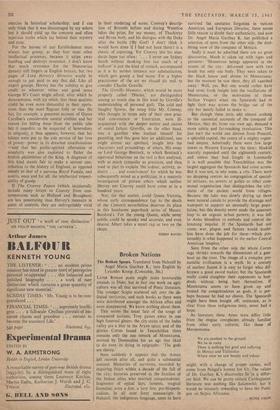Broken Nations
The Broken Spears. Translated from Nahuatl by Angel Maria Garibay K.; into English by Lysander Kemp. (Constable, 30s.)
LATER Roman poets might make honourable amends to Dido; but in fact one work on agri- culture was all that survived of Punic literature. The younger Scipio scattered salt over the de- feated territories, and such books as there were were distributed amongst the African allies and soon disappeared. We know nothing about them.
This seems the usual fate of the songs of conquered nations; Troy passes away in one high funereal gleam; the city-states of the Indus valley are a blur in the Aryan epics; and of the glories Cortes found in Tenochtitlan there remains only the one remark of Montezuma, revived by Desmoulins for an age that liked to do even its dying in epigraphs: 'The gods are thirsty.'
Now suddenly it appears that the Aztecs left records after all, and quite a substantial amount. Memories of survivors, recorded by inquiring friars within a decade of the fall of the city; histories preserved in the families of the Indian allies who married conquistadores; fragments of epical lays, laments, magical formulas; even a few, a very few, pre-Hispanic codices. In all over forty manuscripts in Nahuatl. the indigenous language, seem to have survived the centuries forgotten in various American and European libraries; there seems little reason to doubt their authenticity, and now Dr. Angel Maria Garibay K. has published a selection of texts from the other side, the dust- biting view of the conquest of Mexico.
Sadly it must be admitted there are no great discoveries. Much is taken up with signs and
portents: 'Monstrous beings appeared in the streets of the city: deformed men with two heads but only one body. They were taken to the black house and shown to Montezuma; but the moment he saw them, they all vanished away.' Well, yes. But one would rather have had some fresh insight into the vacillations of Montezuma, or the motivation of those Sicilian Vespers when the Spaniards had to fight their way across the bridge out of the city but nearly failed to make it.
But though these texts add almost nothing to the canonical accounts of the conquest of Mexico, they do, from our own age, demand a more subtle and far-reaching revaluation. This just isn't the world one derives from Prescott, a splendid capital, the centre of a mighty organ- ised empire. Admittedly there were few large towns in Western Europe at the time: Madrid scarcely expanded until the eighteenth century, and unless they had fought in Lombardy it is well possible that Tenochtitlan was the largest aggregate the Spaniards had come across. But it was not, in any sense, a city. There were no shopping centres, no congregation of special- ist artisans, no sewers or police or other com- munal organisation that distinguishes the city- states of the ancient world from villages. Because the lake was slowly drying up there were natural canals to provide the drainage and transport to support an unusually large popu- lation; but this density never made the quantum leap to an organic urban pattern; it was left to Aztec bloodlust to embody and control the lemming impulse. If the Spaniards had not come, war, plague and famine would doubt- less have done the job for them—which pre- sumably is what happened to the earlier Central American 'empires.'
Seen from the other side the whole Cortes saga shrinks towards the dimensions of a gun- boat up the river. The image of a complex pre- metallic civilisation is a myth. In a century of nuclear fission it is easy to forget what dif- ference a good sword makes; but the Spaniards really could slaughter their opponents in hun- dreds without being hurt themselves. If Montezuma seems to have given up and treated the conquistadores as gods, it is per- haps because he had no choice. The Spaniards might have been bought off; resistance, as is clear from these indigenous texts, never had a hope.
As literature these Aztec texts differ little from the elegiac complaints already familiar from other early cultures, like those of Mesopotamia.
We are crushed to the ground We lie in ruins
There is nothing but grief and suffering In Mexico and Tialtelolco
Where once we saw beauty and valour might, with a change of proper names, well come from Ningal's lament for Ur. The values of Dr. Garibay K.'s discoveries lie in a differ- ent field. We can be pretty certain Carthaginian literature was nothing like Salammbo; but it would be intensely rewarding to have the Punic gen on Scipio Africanus.
PETER FISON


































 Previous page
Previous page